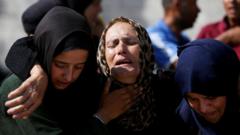**As tensions rise in the Middle East, Iran's participation in the BRICS summit aims to solidify alliances against the backdrop of recent military actions from Israel and the US.**
**Iran Seeks Support from BRICS Amid Isolation and Conflict**

**Iran Seeks Support from BRICS Amid Isolation and Conflict**
**Tehran Turns to Emerging Economies to Counter Western Influence Following Military Strikes**
Iran enters a crucial phase as it grapples with the aftermath of 12 days of conflict, largely isolated in the Middle East due to military operations led by Israel and the United States. To combat this, the Islamic Republic is looking towards the BRICS coalition, comprised of Brazil, Russia, India, China, and South Africa, among others, for support. Starting this Sunday in Rio de Janeiro, Iran's attendance at a two-day BRICS meeting offers a chance to exhibit solidarity with major global players, despite ongoing sanctions and looming military threats primarily connected to its nuclear ambitions.
Following the recent military interventions against Iran, the BRICS bloc responded with a statement that expressed “grave concern” over the events, labeling them as violations of international law and the United Nations Charter. Nevertheless, the coalition refrained from explicitly blaming either Israel or the United States, highlighting underlying divisions within the group about the severity of the response.
Analyst Oliver Stuenkel, an authority on BRICS from the Getúlio Vargas Foundation in Brazil, noted that there is a lack of consensus on the issue of Iran across the member countries. He commented that the BRICS' watered-down statement reflects the desire to avoid confrontation while attempting to maintain the bloc's overarching goal of recalibrating global power away from the West.
The BRICS summit serves as more than just a diplomatic forum for Iran; it is a critical moment for the country to secure a stronger foothold in the world arena while facing mounting challenges on multiple fronts. As Iran seeks to shore up its international relationships, the dynamics within BRICS could play a significant role in its strategy moving forward.
Following the recent military interventions against Iran, the BRICS bloc responded with a statement that expressed “grave concern” over the events, labeling them as violations of international law and the United Nations Charter. Nevertheless, the coalition refrained from explicitly blaming either Israel or the United States, highlighting underlying divisions within the group about the severity of the response.
Analyst Oliver Stuenkel, an authority on BRICS from the Getúlio Vargas Foundation in Brazil, noted that there is a lack of consensus on the issue of Iran across the member countries. He commented that the BRICS' watered-down statement reflects the desire to avoid confrontation while attempting to maintain the bloc's overarching goal of recalibrating global power away from the West.
The BRICS summit serves as more than just a diplomatic forum for Iran; it is a critical moment for the country to secure a stronger foothold in the world arena while facing mounting challenges on multiple fronts. As Iran seeks to shore up its international relationships, the dynamics within BRICS could play a significant role in its strategy moving forward.




















